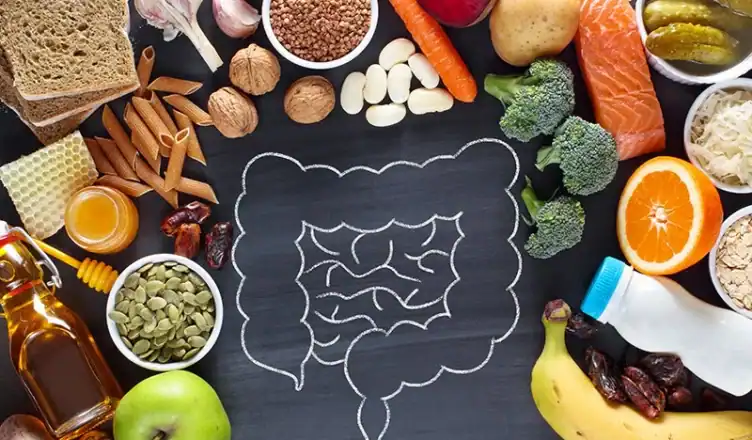A healthy gut is the cornerstone of overall wellness—impacting everything from digestion and immune function to mental clarity and skin health. Your gut microbiome, a complex ecosystem of trillions of bacteria, plays a vital role in nutrient absorption, vitamin production, inflammation regulation, and even mood balance via the gut-brain axis.
In an era of ultra-processed foods and chronic stress, supporting your gut naturally is more essential than ever. Below are 9 evidence-based strategies you can start today to naturally enhance your gut health.
1. Eat More Fiber-Rich Foods
Dietary fiber serves as the main energy source for your gut’s beneficial bacteria, helping them thrive and maintain balance. As they ferment fiber, they produce short-chain fatty acids (SCFAs) like butyrate, which reduce inflammation and support colon health.
High-fiber foods to include:
- Oats
- Lentils and chickpeas
- Apples and berries
- Broccoli and leafy greens
Aim to consume both soluble and insoluble fiber for optimal digestive function.
Learn more: Health Benefits of Fiber – Mayo Clinic
2. Limit Sugar and Processed Foods
Refined sugars and processed foods feed harmful gut bacteria and yeast (like Candida albicans), leading to dysbiosis and chronic inflammation. Additives in processed foods can also damage the intestinal lining, contributing to leaky gut syndrome.
Healthy snack swaps:
- Fresh fruits
- Raw nuts
- Dark chocolate (min. 70% cocoa, in moderation)
Stick to whole, nutrient-dense foods to support microbial balance.
3. Incorporate Probiotic-Rich Foods
Probiotics are beneficial live microbes that support and restore a healthy balance in your gut microbiota. Food-based probiotics are often more bioavailable than supplements.
Excellent probiotic sources:
- Yogurt with live cultures
- Kefir
- Kimchi and sauerkraut
- Miso and tempeh
For individuals who are lactose intolerant or prefer to avoid dairy, consider incorporating plant-based alternatives such as almond, coconut, or soy yogurts that contain live active cultures. Additionally, fermented vegetables like kimchi, sauerkraut, and pickled cucumbers offer excellent non-dairy probiotic options to support a healthy gut microbiome.
👉 Reference: Probiotics – National Center for Complementary and Integrative Health (NCCIH)
4. Prioritize Quality Sleep
Lack of sleep disrupts your circadian rhythm, which in turn impacts your gut microbiome diversity. Poor sleep can disrupt gut balance, increase inflammation, and weaken stress resilience.
Tips for better sleep:
- Maintain a regular sleep-wake schedule
- Avoid screens 1 hour before bedtime
- Keep your bedroom cool, quiet, and dark
Strive for 7 to 9 hours of quality, uninterrupted sleep each night to support optimal gut and overall health.
5. Manage Stress Effectively
Chronic stress disrupts gut bacteria balance and triggers inflammation. It’s also associated with irritable bowel syndrome (IBS) and worsening gut barrier integrity.
Effective stress-reducing strategies:
- Mindfulness meditation
- Yoga and breathwork
- Regular exercise
- Spending time in nature
Resource: How Stress Affects Your Body – Harvard Health
6. Stay Hydrated
Proper hydration helps maintain the mucosal lining of the intestines and ensures smooth digestion. Lack of hydration can slow your digestion, can cause constipation, and disrupt the balance of your gut bacteria.
Hydration tips:
- Aim to drink at least 8 glasses of water daily to support digestion and overall gut function.
- Add lemon, mint, or cucumber for flavor and antioxidant boost
💡 Herbal teas like peppermint or ginger tea can also soothe the digestive tract.
7. Use Antibiotics Responsibly
While antibiotics are sometimes necessary, they can indiscriminately kill both harmful and beneficial gut bacteria. Repeated use may lead to long-term imbalances and increase the risk of antibiotic-resistant strains.
Tips:
- Only take antibiotics when prescribed
- Complete the full course as directed
- Follow up with probiotic foods or supplements
8. Eat Mindfully and Chew Thoroughly
Digestion starts in the mouth. Chewing food thoroughly stimulates saliva production and helps your body break down nutrients more efficiently.
Mindful eating practices:
- Sit down and focus solely on your meal
- Chew each bite 20–30 times
- Avoid multitasking or eating on the go
This promotes better digestion and enhances satiety cues, helping you avoid overeating.
9. Add Prebiotic Foods to Your Diet
Prebiotics are non-digestible fibers that “feed” your good gut bacteria. When paired with probiotics, they create a synbiotic effect, boosting microbial diversity.
Top prebiotic-rich foods:
- Garlic and onions
- Leeks and asparagus
- Bananas (especially slightly green)
- Chicory root and Jerusalem artichoke
Final Thoughts
Improving your gut health doesn’t require drastic changes—just consistent, mindful habits. A diet rich in fiber, probiotics, and prebiotics, combined with quality sleep, hydration, and stress management, can transform your digestion, mood, immunity, and overall vitality.
By taking care of your gut, you’re nurturing from the inside out.







